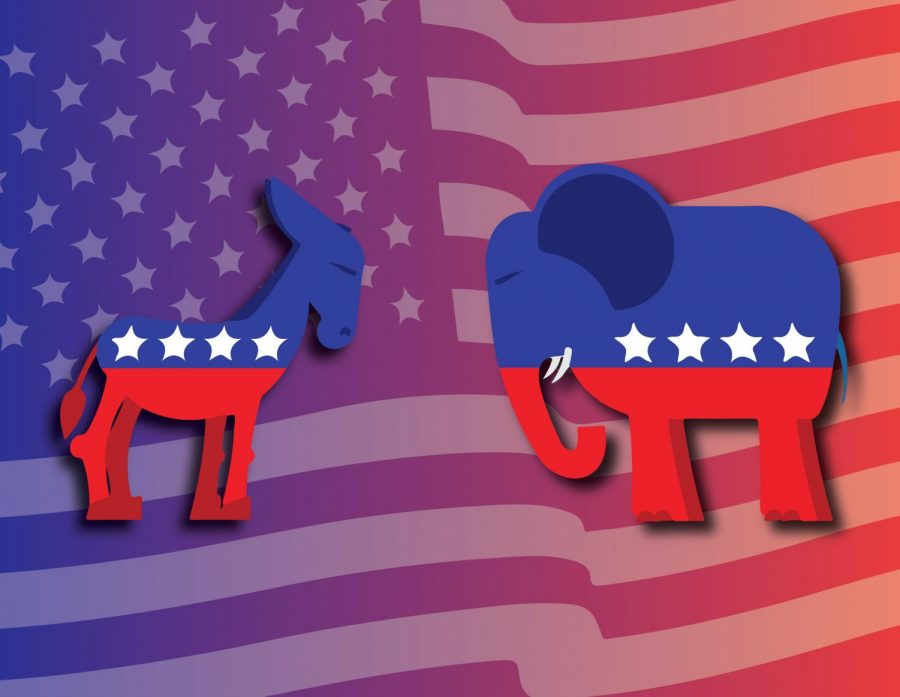Political Differences Should Not Divide Americans
America is divided. In the aftermath of the presidential election, all I see when I go on social media or talk to people is the stark division between political parties. I see posts of people saying that if you vote for one candidate or the other, you can’t be their friend. There was a time when people didn’t base their entire perception of a person off their political views alone. There were still differences, but they didn’t define the entire perception of a person. Has politics become so polarized that we can’t look at a person beyond their political affiliation?
When I think about political division, I think of my extended family. In a few short weeks, I will return home in the continuing aftermath of the election, where politics will likely underline every part of conversation as the unspoken elephant in the room. I’m one of the few Democrats in my extended family, which almost makes me a physical example of the problems they think the opposing party has caused. There are times when I sit with my extended family at Thanksgiving or Christmas and the Democratic Party is mentioned in some way, shape or form and I feel their eyes shift over to me, asking me to answer for the entire political party.
It sticks out like a sore thumb, making the dynamic uncomfortable and awkward. I used to dread those family conversations, knowing that the beliefs I held were about to be called into question. However, there are still so many other parts of my family that I love and appreciate outside of our different political ideology and beliefs; we are united under the common bond of being related.
I’ve changed how I approach political conversations with them, focusing on just explaining my beliefs instead of trying to change their mind and ending the conversation at that. It has allowed for a change in my family dynamics, from focusing on our opposing political ideals to being able to focus on the other things that make them my family members. Politics may shape conversations with various members of my family, but it doesn’t define my entire relationship with them anymore.
I’ve tried to apply this to people outside of my family, but this, to me, has always been a bigger hurdle. There is no common bond of being related to each other, and all anyone wants is to be around people that have similar interests and perspectives. It can be much harder to see why I would want to discuss politics with someone who has such starkly different views than me. But isn’t that the point of politics? Everyone has different priorities in what they want from the government or what they want the government to do for them.
I can’t change my family’s mind on politics, so can’t the same thing be applied to my friendships as well? I can talk about why I believe in certain political ideas or candidates and explain why, but I don’t have to change their minds. If we shut people out and stop being their friends solely due to political beliefs, we’re shutting out someone who has more to offer than just those beliefs. This is only one facet of a person, and placing too much weight on this one particular idea is a dangerous idea. We need to work to dispel the idea of confining someone to one group, such as a political party, instead of looking at them as an individual with so many other things to offer.
When did it come to this? When did we place people into borders based on the candidate or political party they support? Politics has so much weight in today’s society. We place lawn signs and flags in our yards, pledging support for a candidate. We post on social media and say that we can’t like people that vote differently. We scoff at people who have different political ideas than us in conversation. Politics are important; they shape the government that has become more increasingly involved in our lives. But should they be what define us?
I am so much more than a Democrat; I have other hobbies, passions and aspirations in my life that define me beyond my political ideology. Placing so much weight on the idea of a political party to the point that we can’t look at someone beyond their involvement in it only increases the polarization between parties. It worsens the dynamics that our nation has only just begun to grapple with. We are all people of this one nation: Democrat, Republican, Libertarian, Green, Independent or whoever you choose to support. Creating this mentality where we can’t be friends with people who vote differently is only dividing us further.
Abraham Lincoln once said, “A house divided cannot stand.” I look at the world around me and see this dangerous division throughout election week. We have to work to dispel the idea of focusing solely on someone’s political ideology. All of us have more to offer beyond who we chose to support this election. We need to look at each other and unite under our common bond; we are all Americans, no matter who wins this election or the next one or the one after that.
Samantha Scott, FCRH ’24, is an international political economy major from Columbus, Ohio.








































































































































































































